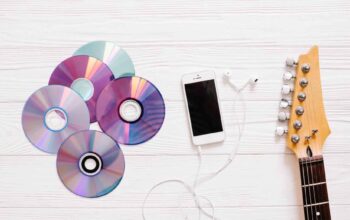Every day people listen to music for various purposes. They enhance their mood, recall memories, and get aesthetic pleasure with specific songs and melodies. But did you know that music can be highly beneficial for learning? Sometimes we are full of energy and power to deal even with the most tedious tasks, but some days require a huge effort just to open a book and read several sentences.

You can turn on your “study mode” on such days by listening to music.
Uplift our mood.
When you listen to music you like, the blood flow increases and influences brain regions related to emotions. Have you ever felt that even the first chords of your favorite music “light up” your brain and leave a soothing wave of positive vibes in your body? In fact, your body represents Pavlov’s dog effect. Your brain releases dopamine as a reflection of pleasure when hearing beloved music. When you feel uplifted, you are more likely to do even boring things.
Also Read: 4 Best Apps for Music Streaming You Must Have
Spark inspiration.
Whether you struggle with blank page syndrome or can’t decide on music essay topics, music can boost your mood and make you more inspired and determined to study. As a result, uplifted with new ideas, you become more open to new knowledge and study better.
Increase attention and focus.
Have you ever heard about the Mozart effect? One research has shown that when students listen to Mozart’s music, it increases their general intelligence or IQ. In fact, it doesn’t matter what music you listen to, as long as it can improve your ability to concentrate. Music serves as a warm-up for your brain and improves your visual-spatial abilities.
Even after a 10-minute listening session with your favorite songs, you become more alert and engaged with your studies and other activities.
Enhance cognitive functions.
Recent research has shown that some students increase their cognitive functions and intellectual performance. Individuals who need extra stimulation will significantly benefit from listening to the music, while others may not receive such a positive output. Depending on personality and the music chosen, students may greatly benefit by listening to the music while preparing for exams and doing homework assignments.
Reduce stress.
When you are overwhelmed with recent events or disturbing thoughts, music can carry you away with pleasing notes and relaxation. When you feel calm, it’s much easier to learn and focus, as stress makes you inattentive and confused. Recent research has shown that music lowers our heart rate, improves our well-being, and reduces physical and emotional stress levels.
Also, we recommend you try singing even if you think you are a terrible singer. Pay attention to your feelings after a few minutes of singing and return to those melodies that uplift your mood.
Choosing Music for Studying
People are different in their music choices, and while one song may be great for one, others will struggle with listening to the same song. If listening to music while studying sounds appealing, here are some music suggestions.
Classical music. There can’t be a universal choice when talking about classical music, and it will depend on your preferences. We suggest you try listening to Claude Debussy’s “Clair de Lune,” Johann Sebastian Bach’s “The Well-Tempered Clavier,” and Erik Satie’s “Gymnopédies.”
Ambient. This music genre focuses on creating a particular state of mind and atmosphere that can be a great study tool. Compositions from Brian Eno, Harold Budd, Max Richter, and Hiroshi Yoshimura can help you stay focused and concentrated.
Sounds of nature. Recordings of rainstorms, ocean waves, or forest soundscapes can provide a soothing and peaceful background when you study. You can experiment with sounds of nature apps or recordings from YouTube.
Lo-fi. Many students have found this music genre to be a valuable tool for their studies, and its popularity continues to grow. Lofi Girl, Chillhop Music, and 2814 are highly recommended for a relaxed and focused atmosphere.
Jazz. It’s a vast genre that combines energetic and soothing harmonies that can be an excellent fit for your study sessions. Think about whether you prefer instrumental compositions or songs. Try various jazz mixes on YouTube or Spotify to find out which sounds work best.
Tips to Make Music your Companion in Studying
Here are some recommendations to make your music journey more beneficial for your studying:
- Add songs and appealing playlists to your favorites, or create your playlists to make music quickly accessible when you start a learning session.
- Experiment with different music genres and artists to find those compositions that put you in the right mood for studying.
- Use quality headphones. Spend money on over-the-ear headphones with noise-canceling functions to make your experience better.
- Keep your playlists at around 30-40 minutes, and take a break right after the music turns down.
- Don’t listen to the music too loud. You harm your ears and exhaust your cognitive functions.
- Choose music sources without ads or dialogues (e.g., radio) as it creates additional distractions.
Also Read: Why Your Music Stops When You Open Facebook?
Wrapping Up
We all listen to different music and have unique relationships with our favorite artists and songs. Luckily, we can use it as an excellent tool for various purposes and for creating a specific state. Make a playlist for your study session and determine how it may benefit your learning outcomes.




